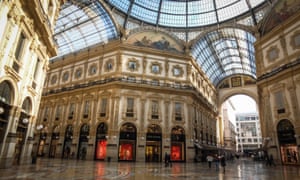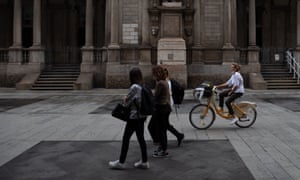Milan’s mayor, Beppe Sala, admits he made mistakes. In late February 2020, a week after the first locally transmitted coronavirus case was confirmed in Italy, he shared a promotional video on his Facebook page with the slogan “Milan does not stop”.
The clip contained images of people hugging, eating in restaurants, walking in parks and waiting at train stations. It was not Sala’s finest hour.
The city was not under lockdown at the time but it had quickly come to a standstill as tourists fled and commuters began working from home. Sala was not alone in his assessment of the risk of the virus and several scientists and politicians were giving mixed messages, but by the time the wider Lombardy region went into lockdown on 8 March, he was rigorously urging citizens to stay at home.
He says he has learned from his experiences.
“At the beginning of the pandemic, and even still a little bit today, the scientific world was really divided,” Sala said in an interview with the Guardian. “In Milan, two health experts in February gave different opinions. One said coronavirus was only a little bit worse than the flu and the other said it was really serious.
“One thing I have learned is that faced with an unexpected and unusual situation, it’s OK to try to interpret things with good sense. But you also need to be more formal, turn to the government and ask for formal instructions on how to manage the situation. This is an error I made, as did many others, and that I wouldn’t make again.”

Other than lessons learned, Sala said the experience reconfirmed the city’s generosity and values to him. Many young people joined Milan Helps, a vast network that has assisted people over 65 and those at high risk of infection at home, and an emergency fund collected EUR14m (GBP13m) within a few weeks.
Navigating a city with a population of 1.4 million through a pandemic is no easy task. Milan and its wider province were at the centre of Italy’s second wave. The city is also Italy’s economic engine. It hosts every sector from finance to fashion, and responsibility for the country’s recovery rests largely on its shoulders.
So as he continues to manage the pandemic, Sala is also charting Milan’s future. He leads the C40, a taskforce of mayors from cities around the world formed in May to coordinate efforts to support a low-carbon, sustainable recovery from the pandemic.
“It’s not a rhetorical organisation, but a true one in which we meet a lot and spend a lot of time defining a common strategy,” he said. “Faced with this pandemic, we should take the opportunity to speed up [sustainable] policies.”
Sala, a politician with the centre-left Democratic party who was elected mayor in 2016, has made some bold moves to cope with the city’s high pollution. In early 2019, the authorities introduced Area B, a restricted traffic zone that covers 70% of the city. Heavily polluting cars are barred from entering Italy’s largest low-emission zone between 7.30am and 7.30pm from Monday to Friday.
Other plans include a ban on diesel heating systems in public and private office buildings from October 2023 – the same year by which all petrol stations will have to have charging stations for electric cars – and having a full fleet of electric buses within the next eight years.
Working out how people could move around safely was one of the biggest challenges the city’s authorities had to tackle early in the pandemic, but it was also an opportunity to promote cycling. There are 51 cars for every 100 inhabitants in Milan. “Cities that are really advanced have managed to get to 40 for every 100 inhabitants,” Sala said.

One of the city’s most ambitious initiatives is the gradual creation of 300km (185 miles) of cycle paths. During the spring lockdown, 35km of streets were transformed for cycling and walking as part of the initial phase. “It’s true that this has created some division, not everyone is in favour, but this is the direction all cities are going in,” he said. “Milan is not a massive city, and it is flat.”
A proportion of the EUR209bn that Italy is poised to receive from the European recovery fund is expected to be invested in the green economy. Green policies adopted in Milan had also created jobs, Sala said, and startups that incorporate sustainable elements, especially those in areas beyond the city centre, had been given incentives.
Before the pandemic, there were enough bars, restaurants and taxis in central Milan to support a population that included many thousands of tourists and commuters a day as well as its inhabitants. Now with people still working from home and tourism not expected to recover for some time, the city has to adapt.
In this respect, Covid-19 has given impetus to the “15-minute city”, a concept first unveiled by Parisian authorities in February whereby everything a resident needs – be it shops, schools or gyms – can be reached within 15 minutes of their homes by foot, bike or public transport. The concept is one of the strategies Sala and his C40 counterparts are developing as they visualise their post-Covid cities, and he is determined that Milan will set the example.
“There are cities in Italy that are more beautiful,” he said. “But Milan is the only city that offers a lot of history and also a window into the future.”